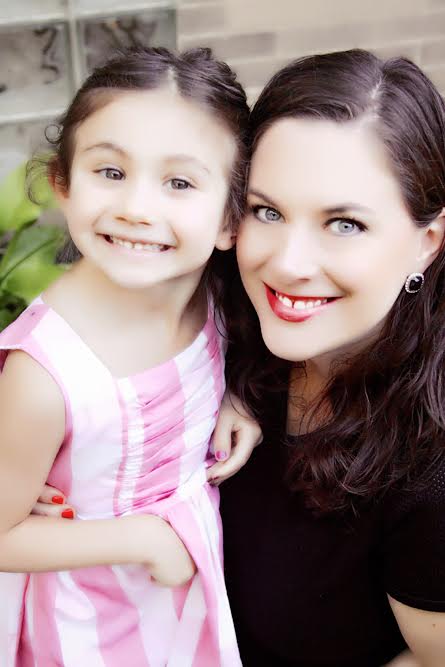If there's one thing I've learned over the
last four years of being a parent, it's that I have absolutely no idea what I'm
doing. I’m just being honest. I read all the books, took all the classes,
listened to all the unwanted advice, and watched all the parenting
videos but let's be real - there is nothing that can prepare you for having
your first child. It's a crazy roller coaster ride of emotions. Between the
lack of sleep, adjusting to a new life and new normal, and learning about your
child, it's easy to get caught up in the day to day hum-drum of life and forget
our focus as parents. While I admit that I’m still learning every day how
to do this parenting gig right, there was one concept that I was certain of
from the day that Maddy was born that I wanted her to understand: How to not
only be good but to do good in this world.
I believe this characteristic of fostering
good works starts early in childhood development and is either fostered to its
full potential or thrown to the wayside as our children grow up to be
adults. I would say that from her sixth month on, Michael and I made it a
point to begin instilling the ‘Not only be good but do good’ mentality into
Maddy’s everyday life. It’s not a method that comes easily because it requires
constant attention to our own actions, but it’s something that we work towards
on a daily basis in getting her to understand good works and how our actions,
words and deeds affect others.
Fast forward four years later and I’d say our
hard work is paying off. I see how attentive and caring she is with her friends
at school. Just the other day I saw her rubbing the back of a classmate that
seemed to be sad and asked, “Chloe, are you OK?” I see how she does nice things
around the house for us without asking and how she uses her manners to express
herself and her needs. I see the kindness she expresses to strangers and the
acute awareness she’s developed in recognizing that she’s not alone in the
universe and that other people’s feelings and needs matter.
Now, don’t get me wrong. She can totally test
my patience and my will. We have plenty of bad days, and there are times that I
feel like the majority of my time is spent being the behavior police but
overall, I think we’re on the right track. We expect a lot from Maddy which
most parents would poo-poo for a four year old but I don’t understand why to be
perfectly honest. I’ve always felt that our kids, even the babies and toddlers
while they are still young, are people just like adults so why do we set such
low expectations for them? I think that sometimes we shortchange our children
and pigeonhole them into a category of, “Well, she/he is only three. What can a
three year old possibly learn about doing good?”
My response? A lot.
I've come up with four ideas I think that fit the mold of teaching our children to not only be good but to do good as well. These are things that we’ve worked on each day since Maddy was a baby to make a habit and routine in her life. They have proven to be beneficial in shaping the person that she’s becoming so I hope you find them helpful for your little one as well.
I've come up with four ideas I think that fit the mold of teaching our children to not only be good but to do good as well. These are things that we’ve worked on each day since Maddy was a baby to make a habit and routine in her life. They have proven to be beneficial in shaping the person that she’s becoming so I hope you find them helpful for your little one as well.
ONE. Catch
my child being good and make sure she knows how proud I am of her.
When the days are long and crazy, it's easy
to see the disruptive or negative behavior. I need to do a better job at seeing
the positive behavior while letting Maddy know that I see and approve of her
choices and decisions to do good throughout the day. Our children relish and
crave our attention, adoration and applause. They learn through our reactions
to their behavior what doing good looks and feels like and they want to
continue doing those things which feel good. It's a win-win for everyone,
really.
TWO. Be the model for doing good.
Through a child's eye, everyone counts.
Everyone is important - the sales person who is rude to me, the person who cuts
me off in traffic, the neighbor who never picks up after their dog - each of
these situations are opportunities to show our children how to treat others
with kindness even when we feel it's hard to do. How I handle these types of
situations sends a message that our children hold onto for a long time and
remember. I can only hope that Maddy sees me as being kind.
THREE. Make sure that my words and actions
are aligned with my values.
It's one thing to constantly say, "Share
your toys with so and so. Share the slide. Be nice to Sally." But what do
my actions say? Force your child to give up their seat on the swings if you see
other children waiting - this is a perfect opportunity to show your child what
it means to give and share. When another child falls down on the playground,
have your child offer a helping hand. Our children may be too young at this
point to truly understand the value of what they are doing but they will soon
learn to associate kindness with helping others.
FOUR. Teach
them to do good and big things in their small world.
In our busy lives, I think it's easy to get
caught up in the larger community service projects because they're highly
publicized and well-defined. Sometimes it's harder to notice the smaller acts
of good that can be, or are done, by our little ones.
While our children are young, I think it's
important to make doing good meaningful to them on a level that they can
understand easily through small acts of kindness; sending thank you cards to
family and friends for gifts, sharing their special or favorite toys with
friends, being mommy or daddy's helper, saying "Please" and
"Thank you", giving small gifts of appreciation to day care and
school teachers. All of these small acts of kindness make big impressions on
the hearts and minds of our little ones.
What are your thoughts? What advice do you
have to share with other parents looking to raise kind, thoughtful, and
generous children?















No comments:
Post a Comment